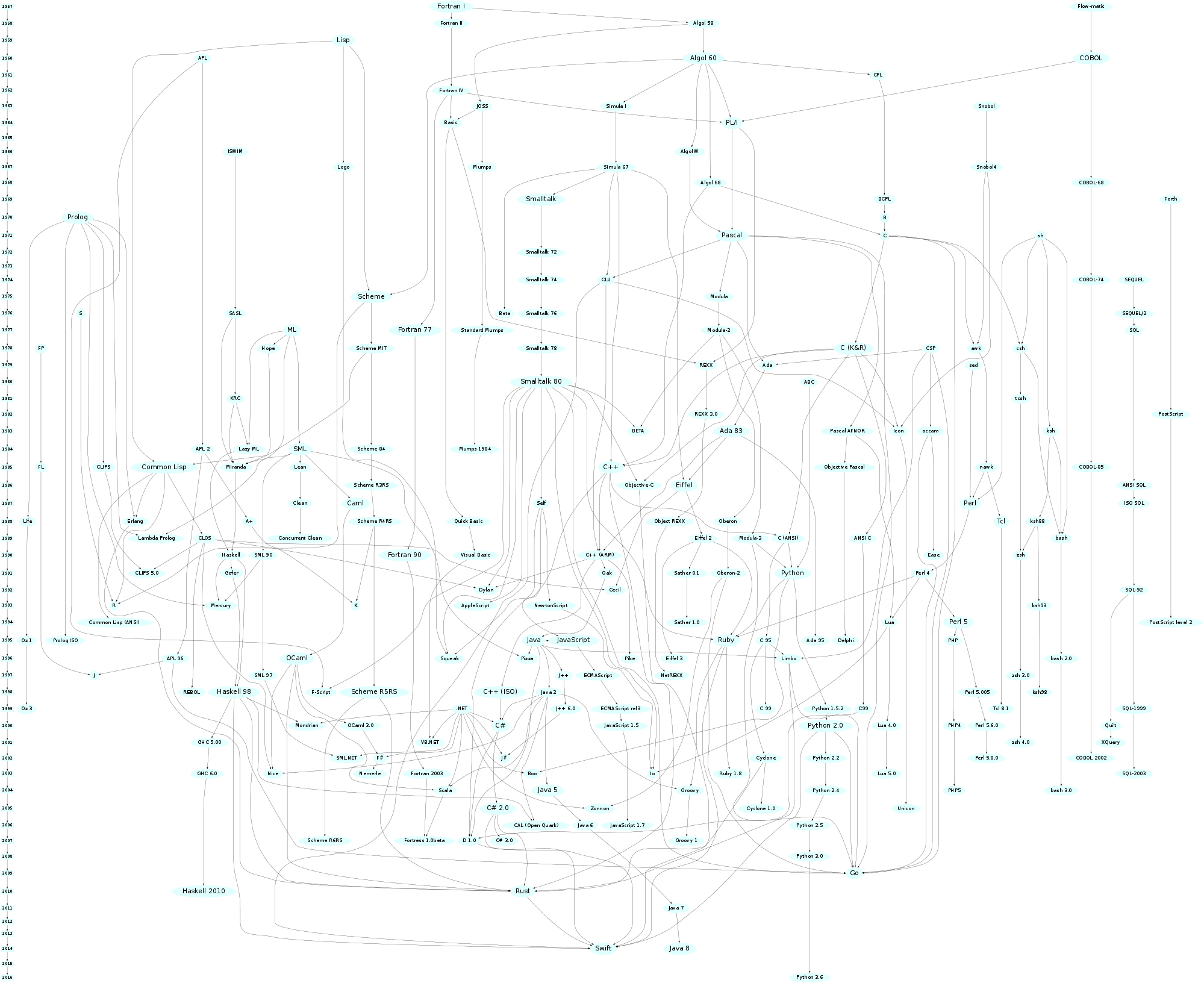Timeline of Programming Languages
This is a record of historically important programming languages, by a timeline of years.
The following image is the timeline of programming languages:

The page above is from Pascal Rigaux's website, the author also shows the history of programming languages concepts1. Besides, he gives an summary for the syntax difference across important programming languages2.
Tips: If you want to see the predecessors and descendants of each programming language up to 2019, please checkout this page: https://lijiansong.github.io/clang-llvm-tutorial/
REFs
- https://en.wikipedia.org/wiki/Timeline_of_programming_languages
- https://en.wikipedia.org/wiki/History_of_programming_languages
- https://www.levenez.com/lang/
- http://www.jasoonv.com/HOPL/
- http://rigaux.org/language-study/
FOOTNOTEs
-
This interesting website shows the history of programming languages concepts, include but not limit to Abstract data type, BNF(Backus-Naur Form), Class, Closure, High order function, Lazy evaluation, List comprehension, OOP, Operator overloading, Parametric Polymorphism, Type inference and etc. ↩
-
This interesting page shows the syntax differences across programming languages, from the perspective of:
- Various
- commenting
- documentation comment
- information about the current line and file
- tokens
- breaking lines (useful when end-of-line and/or indentation has a special meaning)
- variable assignment or declaration
- grouping expressions
- block (grouping statements, especially when statements are not expressions)
- use a block as a return value (when statements are not expressions)
- equality / inequality
- comparison
- runtime evaluation
- manual memory allocation
- force garbage collection
- Functions
- function call
- partial application (in the examples below, a normal call is "f(a,b)")
- function definition
- anonymous function
- function return value
- function called when a function is not defined (in dynamic languages)
- runtime inspecting the caller information
- function composition
- identity function
- Control Flow
- sequence
- if_then
- if_then_else
- ifnot_then (unless)
- multiple selection (switch)
- loop
- breaking control flow
- exception
- call-with-current-continuation
- Types
- declaration
- annotation (or variable declaration)
- cast
- mutability, constness
- Object Oriented & Reflexivity
- method invocation
- object creation
- object cloning
- manually call an object's destructor
- class declaration
- testing class membership
- get the type/class corresponding to an object/instance/value
- methods available
- inheritance
- has the method
- current instance
- accessing parent method
- accessing child method
- Package, Module
- package scope
- declare
- import
- Strings
- type name
- character type name
- character "z"
- strings
- multi-line
- convert something to a string (see also string interpolation)
- serialize (marshalling)
- unserialize (un-marshalling)
- sprintf-like
- simple print
- string equality & inequality
- string size
- string concatenation
- duplicate n times
- upper / lower case character
- uppercase / lowercase / capitalized string
- ascii to character
- character to ascii
- accessing n-th character
- extract a substring
- locate a substring
- locate a substring (starting at the end)
- Booleans
- type name
- false value
- true value
- logical not
- logical or / and
- Bags and Lists
- type name
- list concatenation
- list flattening
- list constructor
- list/array indexing
- adding an element at the beginning (list cons)
- adding an element at index
- adding an element at the end
- first element
- all but the first element
- last element
- all but the last element
- get the first element and remove it
- get the last element and remove it
- for each element do something
- transform a list (or bag) in another one
- transform two lists in parallel
- find an element
- keep elements
- partition a list: elements matching, elements non matching
- split a list
- is an element in the list
- is the predicate true for an element
- is the predicate true for every element
- smallest / biggest element
- join a list of strings in a string using a glue string
- list size
- iterate with index
- remove duplicates
- sort
- reverse
- list of couples from 2 lists
- 2 lists from a list of couples
- lookup an element in a association list
- list out of a bag
- f(... f(f(init, e1), e2) ..., en)
- f(e1, f(e2, ... f(en, init) ...))
- Various Data Types
- tuple type
- tuple constructor
- computable tuple (these are a kind of immutable lists playing a special role in parameter passing)
- reference (pointer)
- optional value
- record
- union type declaration
- enumerated type declaration
- dictionary
- range
- Mathematics
- type name
- numbers syntax
- addition / subtraction / multiplication / division
- exponentiation (power)
- negation
- random
- operator priorities and associativities
- square root / e-exponential / absolute value
- trigonometry
- logarithm
- euclidean division (both quotient and modulo)
- modulo
- truncate / round / floor / ceil
- bitwise operators
- Threads
- thread definition
- thread creation
- thread object creation
- starting / stopping threads
- passing data directly between threads
- terminating thread communication due to a time-out
- Thread Synchronization
- Joining Another Thread
- Thread Prioritization
- Thread-safe sharing of data without synchronization
respectively. ↩
- Various
-
Is a Cow an Animal? This is an interesting problem, Pixel try to extract a real world problem which "Is a Cow an Animal?" is trying to solve, try to achieve two goals. First is to implement the rules below, rejecting at runtime any malformed program, the second goal is try to enforce the rules at compile-time, e.g.:
- quite easy (eg: ensuring one doesn't feed carrots with grass),
- quite hard (eg: ensuring one doesn't feed cows with carrots or dead_rabbits),
- or very hard (eg: ensuring meat can be eaten only once)
More details about the real world rules, please checkout Pixel's page. ↩